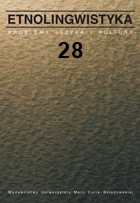Darbas (praca) w niektórych dyskursach litewskich
Darbas (work) in selected Lithuanian discourses
Author(s): Marius Smetona, Irena SmetonienėSubject(s): Language and Literature Studies
Published by: Wydawnictwo Naukowe Uniwersytetu Marii Curie-Sklodowskiej
Keywords: work; Lithuanian discourse; literary discourse; ideological discourse; legal discourse; journalism
Summary/Abstract: The article is an analysis of the Lithuanian linguo-cultural image of work on the basis of lexicographic and textual data. The sources used are The Dictionary of the Lithuanian Language and The Dictionary of Contemporary Lithuanian. Definitions in the two dictionaries differ substantially and reflect, respectively, former and contemporary views on work. The lexicographic treatment of work contains elements of the rural understanding of it as hard, arduous human activity, performed out of necessity and at the same time something that brings joy and functions as the foundation of one‘s life. The dictionaries also contains elements of Soviet ideology, especially the notion of extolment of work and its superiority over people. Data from a few types of discourse (literary, ideological, legal, and journalistic) provide new means of looking at work. Hard work was described by the classic authors in Lithuanian literature, K. Donelaitis, D. Poška, and J. Tumas-Vaižgantas, who pointed to its fundamental meaning, adding to it a poetic flavour and the sense of ennoblement, as well as elevating workers as heroes. The ideological discourse reveals the patriotic sense of work, the legal discourse revolves around the significance of the law. The most diverse is the treatment of work in journalistic discourse: it is a value, an honour, and a duty; it brings satisfaction if it is interesting; it may be treated as a relatively effortless hobby.
Journal: Etnolingwistyka. Problemy Języka I Kultury
- Issue Year: 28/2016
- Issue No: 28
- Page Range: 101-116
- Page Count: 16
- Language: Polish

